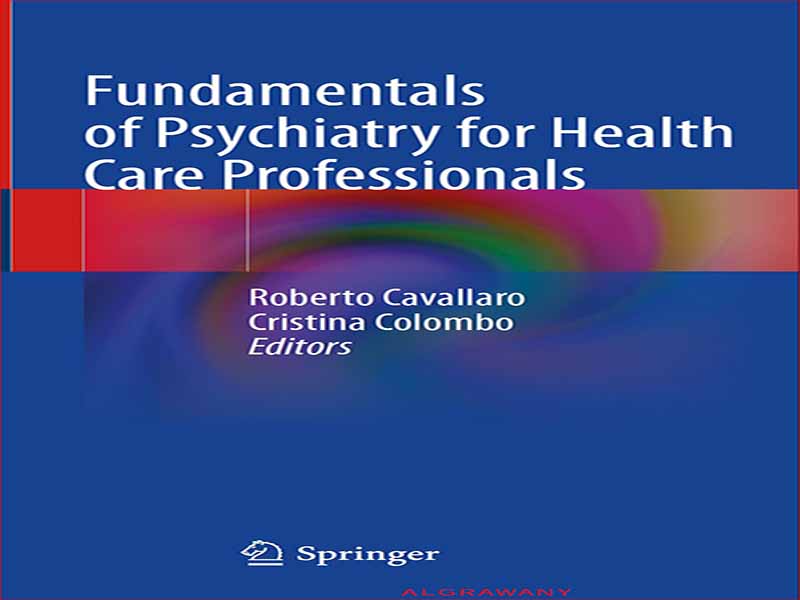- عنوان کتاب: Fundamentals of Psychiatry for Health Care Professionals
- نویسنده/انتشارات: Roberto Cavallaro
- حوزه: روانپزشکی
- سال انتشار: 2022
- تعداد صفحه: 459
- زبان اصلی: انگلیسی
- نوع فایل: pdf
- حجم فایل: 8.72 مگابایت
سازمان جهانی بهداشت (WHO) بهنجاری را حالتی از رفاه کامل جسمی، روانی و اجتماعی تعریف می کند، اما این تعریف محدود است، زیرا سلامت جسمی و روانی را صرفاً به عنوان فقدان یک بیماری جسمی یا روانی تعریف می کند. بازنگری متنی راهنمای تشخیصی و آماری اختلالات روانی هیچ تعریفی از بهنجاری یا سلامت روان ارائه نمیکند، اگرچه تعریفی از اختلال روانی ارائه شده است: اختلالات رفتاری یا عملکرد روانشناختی فرد که از نظر فرهنگی انتظار نمیرود و منجر میشود. به پریشانی روانی، ناتوانی رفتاری، یا اختلال در عملکرد کلی (DSM-5). اختلال روانی به عنوان سندرمی تعریف می شود که با اختلال بالینی قابل توجه در شناخت، تنظیم هیجان یا رفتار فرد مشخص می شود که منعکس کننده اختلال در فرآیندهای روانی، بیولوژیکی یا رشدی زیربنایی عملکرد ذهنی است. اختلالات روانی معمولاً با پریشانی قابل توجهی در فعالیت های اجتماعی، شغلی یا سایر فعالیت های مهم همراه است. پاسخ قابل انتظار یا تایید شده فرهنگی به یک عامل استرس زا یا از دست دادن رایج، مانند مرگ یکی از عزیزان، یک اختلال روانی نیست. رفتار انحرافی اجتماعی (یعنی سیاسی، مذهبی یا جنسی) و تعارضاتی که عمدتاً بین فرد و جامعه است، اختلال روانی نیستند، مگر اینکه انحراف یا تعارض ناشی از اختلال در عملکرد فرد باشد، همانطور که در بالا توضیح داده شد (DSM-5). اما همه این تمایز (هنوز ناقص و قابل بهبود) تا زمان های اخیر چنین نبود، به ویژه تا کشف درمان های مؤثر از یک طرف و از سوی دیگر، به دلیل تغییرات در جامعه که منجر به گسترش این بیماری شد. آزادی های شخصی و به رسمیت شناختن سطوح بالاتری از کرامت و حقوق انسانی، حداقل در کشورهای غربی. مرز بین جنون ذهنی و تعدادی از رفتارهای «خارج از استاندارد» که به آن مرتبط نیستند ممکن است هنوز ظریف به نظر برسد و از زمان های به یاد ماندنی چنین بوده است. ایده های ذهنی «عادی» و «غیر طبیعی» عمدتاً بر اساس معیارهای اجتماعی شکل می گیرند و می توانند پیامدهای اجتماعی عمیقی داشته باشند. آنچه “عادی” تلقی می شود با تغییر استانداردهای اجتماعی تغییر می کند. جامعه عموماً عادی بودن را خوب و نابهنجاری را بد می بیند. برچسب زدن به عنوان “عادی” یا “غیر طبیعی” می تواند عواقب عمیقی برای یک فرد داشته باشد، مانند طرد شدن یا انگ زدن توسط جامعه. انگ و تبعیض به رنج و ناتوانی افراد مبتلا به اختلال روانی (یا تصور میشود که مبتلا هستند) و خانوادهاش رنج میافزاید.
The World Health Organization (WHO) defines normality as a state of complete physical, mental, and social well-being, but this definition is limited, because it defines physical and mental health simply as the absence of a physical or mental disease. The text revision of the Diagnostic and Statistical Manual of Mental Disorders offers no definition of normality or mental health, although a definition of mental disorder is presented: Disturbances of an individual’s behaviour or of his psychological functioning that are not culturally expected and that lead to psychological distress, behavioural disability, or impaired overall functioning (DSM-5). A mental disorder is defined as a syndrome characterized by clinically significant disturbance in an individual’s cognition, emotion regulation, or behaviour that reflects a dysfunction in the psychological, biological, or developmental processes underlying mental functioning. Mental disorders are usually associated with significant distress in social, occupational, or other important activities. An expectable or culturally approved response to a common stressor or loss, such as the death of a loved one, is not a mental disorder. Socially deviant behaviour (i.e. political, religious, or sexual) and conflicts that are primarily between the individual and society are not mental disorders unless the deviance or conflict results from a dysfunction in the individual, as described above (DSM-5). But all this distinction (still imperfect and amenable to improvement) was not such until recent times, in particular up to the discovery of effective treatments on one side and, on the other, to the changes in the society which led to the widening of the personal freedoms and to recognize higher minimal levels of human dignity and rights, at least in western countries. The border between mental insanity and a number of ‘out of standard’ behaviours not related to it might still look subtle and it is so since unmemorable times. Ideas of mentally ‘normal’ and ‘abnormal’ are largely shaped by social standards and can have profound social ramifications. What is considered ‘normal’ changes with changing of societal standards. Society generally sees normality as good and abnormality as bad. Being labelled as ‘normal’ or ‘abnormal’ can have profound consequences for an individual, such as exclusion or stigmatization by society. Stigma and discrimination add suffering to the suffering and disability for who is diagnosed with (or perceived to have) a mental disorder and his family.
این کتاب را میتوانید از لینک زیر بصورت رایگان دانلود کنید:
Download: Fundamentals of Psychiatry for Health Care Professionals



































نظرات کاربران